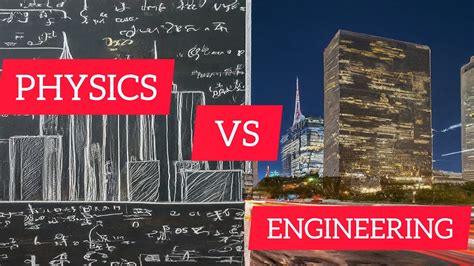Introduction
Physics and engineering physics are two closely related fields that share many fundamental principles, yet they are also distinct in their approaches and applications. This comprehensive guide explores the key differences between these two disciplines, providing insights into their respective strengths and career paths.

Physics
Physics is the foundational science that seeks to understand the fundamental laws of nature governing the universe. Physicists investigate the physical world at various scales, from the subatomic level to the cosmic expanse. They employ mathematical models, simulations, and experimental techniques to unravel the mysteries of matter, energy, and space-time.
Key Features:
- Emphasizes the study of theoretical concepts and fundamental principles.
- Focuses on the development of mathematical models to describe physical phenomena.
- Involves extensive research in areas such as particle physics, quantum mechanics, astrophysics, and cosmology.
Career Paths:
- Research scientist in academia or industry
- Physicist in fields such as nuclear energy, medical physics, and computational science
- Science educator or policymaker
Engineering Physics
Engineering physics is an interdisciplinary field that applies the principles of physics to solve practical engineering problems. Engineers with a physics background design, build, and test systems that meet specific technological challenges. They bridge the gap between theoretical physics and real-world applications.
Key Features:
- Combines physics principles with engineering design and analysis.
- Focuses on the development of practical solutions to scientific and engineering problems.
- Involves coursework in areas such as electronics, optics, materials science, and computer engineering.
Career Paths:
- Engineering physicist in fields such as biomedical engineering, aerospace engineering, and energy technology
- Researcher and developer in industry or government laboratories
- Technical consultant or project manager
Key Differences
1. Research Focus:
- Physics: Fundamental principles and theoretical models
- Engineering Physics: Practical applications and solving technological problems
2. Mathematical Tools:
- Physics: Advanced mathematical models and differential equations
- Engineering Physics: Computational tools, engineering simulations, and design software
3. Experimental Methods:
- Physics: Primarily laboratory experiments to test theories
- Engineering Physics: Prototype building, testing, and system integration
4. Career Objectives:
- Physics: Understand and explain the fundamental laws of nature
- Engineering Physics: Design and innovate technological solutions
Common Applications
The expertise of physics and engineering physics graduates is in high demand across various industries:
Industry | Applications
—|—|
Biomedical | Medical imaging, drug development, tissue engineering
Aerospace | Satellite design, rocket propulsion, spacecraft control
Energy | Solar panels, wind turbines, nuclear reactors
Electronics | Semiconductor devices, integrated circuits, optoelectronics
Materials Science | Advanced materials for construction, biomedical implants, energy storage
New Applications
The convergence of physics and engineering is fostering the development of innovative applications:
- Quantum computing: Engineering practical quantum devices for information processing and cryptography.
- Materials with programmable properties: Developing materials that can change their optical, electrical, and mechanical properties under external stimuli.
- Bio-inspired robotics: Designing robots with advanced sensors and algorithms inspired by biological systems.
Tips and Tricks
- Choose a discipline that aligns with your interests: Explore the different subfields within physics and engineering physics to find what resonates with you.
- Build a strong foundation: Master the fundamental principles of physics and mathematics to succeed in either field.
- Develop practical skills: Gain experience in laboratory or research projects to enhance your problem-solving abilities.
- Network with professionals: Attend industry events, join professional organizations, and connect with experts in your field of interest.
Common Mistakes to Avoid
- Confusing the two fields: Recognize the distinct characteristics and applications of physics and engineering physics.
- Neglecting practical skills: While theoretical knowledge is important, gaining hands-on experience is crucial for engineering physics careers.
- Underestimating the mathematics: Both fields require a solid understanding of mathematical principles.
- Limiting career options: Explore the wide range of career paths available to graduates in both physics and engineering physics.
FAQs
1. Which field has better job prospects?
Both physics and engineering physics offer excellent job prospects in their respective domains.
2. Which field is more in demand?
Engineering physics is in high demand due to the growing need for engineers with physics expertise.
3. Which field requires more education?
Both fields typically require a bachelor’s degree. However, some engineering physics programs offer a combined BS/MS degree.
4. Which field is better for research careers?
Physics is more focused on fundamental research, while engineering physics offers opportunities for both pure and applied research.
5. Which field is more practical?
Engineering physics is more directly applicable to solving practical engineering problems.
6. Can I switch between physics and engineering physics?
Yes, it is possible to switch between the two fields by taking additional coursework or pursuing a graduate degree in the other discipline.
